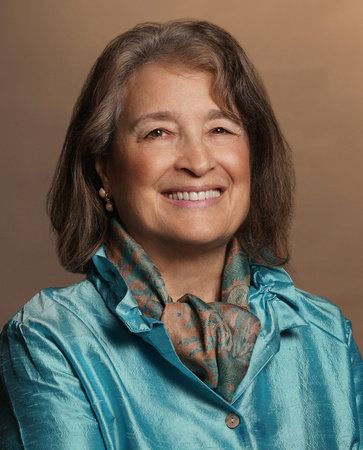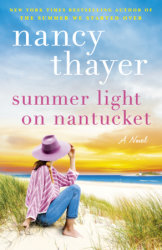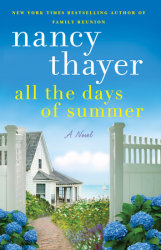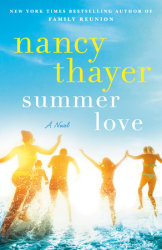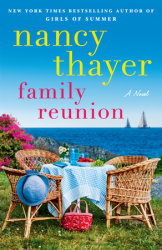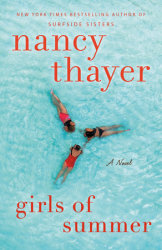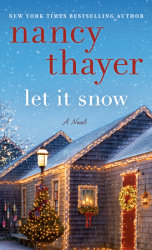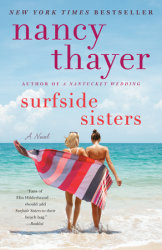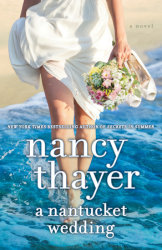Nancy Thayer is the New York Times bestselling author of The Island House, The Guest Cottage, An Island Christmas, and, most recently, Secrets in Summer. She lives and writes in Nantucket, and sets many of her books there, as well. In Secrets in Summer, thirty-year-old Nantucket librarian Darcy Cotterill finds herself entwined in a summer love triangle when her boyfriend Nash, her ex-husband, and a mysterious newcomer converge on the island for the summer. Thayer joined us for a short Q&A about her writing routine, her greatest influences, her unending love of libraries, and why writing a love triangle is so much fun.
PENGUIN RANDOM HOUSE: What’s your writing routine? Where, when, and how does it happen?
NANCY THAYER: I wrote the first six chapters of my first published novel, Stepping, with a pencil on a six-by-nine notebook while I was in Helsinki, Finland. (My first husband had a Fulbright to teach there one semester.) I had one hour while my two small children napped behind their closed bedroom door in a Spartan fourth-floor concrete walkup. I had no dishwasher, no TV, radio, record player (it was 1977), or typewriter. Those chapters changed my life.
Now I write on my desktop computer in my study with a half-moon window looking out over Nantucket harbor.
For the past thirty years, I’ve followed the same routine, although it might be more accurate to say the same routine has possessed me. Every single morning I wake, feed the cat while the coffee brews, take my coffee to my study, and use those first clear quiet shining morning hours for writing. When I travel for work or pleasure, I don’t write, but I know the back of my brain is scribbling notes.
PRH: What do you love most about living on and writing about Nantucket?
NT: I love that I can walk from our house to the library, post office, ferry, grocery store, hospital, school, bookstore, or posh clothing store. I know the people who own these places and who work there; I consider them friends. I feel safe here, enclosed, nestled, so I can allow my imagination to roam free. When I’m stuck on a scene, I go for a walk and return with the problem solved.
My imagination is fired by Nantucket’s history, natural beauty, and by the rhythms and contrasts between the “year-rounders” like me and the summer billionaires. Our house is in the historic district, close to town and to the harbor. Our yard is enclosed with hedges for privacy, and often while I’m quietly reading in my own back yard, I can overhear the most intimate conversations among people who have no idea I’m there. Not that I’d eavesdrop on purpose, of course! But this did inspire Secrets in Summer.
PRH: What’s your trick to crafting the perfect love triangle?
NT: My image of “my” reader is of a young mother who just got her children to bed, one of them has the flu and keeps throwing up, she’s out of 7-UP, it’s rained all day, and her husband is on a business trip in Paris. I want to entertain her, reassure her that this–families, real life, what she’s doing—is the essence, the center point, of life. At the same time, just for a while, I want to lift her out into a more romantic world.
So I always have a good guy, a safe guy, a guy she can trust. Then I toss in a bad boy, because we love our bad boys. We all want Tom Hanks and Johnny Depp. Okay, I don’t want Johnny Depp, I want Gerard Butler, but he’s not as well known, even though he has actually been in jail. . .where was I? I summon up a vision of my bad boy like uncorking a genie from a bottle.
But then crafting. . .that’s hard work. I can give the bad boy a motorcycle, a leather jacket, an earring or tattoo, but I need to find what makes him tick and as I write about him—and I write dozens of pages I never use in the final book—I get to know him better and realize he’s not a truly bad boy. Because, as I’ve said in other places, I love happy endings. And I love happy endings even for the bad boys.
PRH: To what extent does your writing reflect your own life story?
NT: I’ve always used bits and pieces of my life as the starting point for my novels. I’ve written about marriage, divorce, friends, death, birth, jealousy, joy, loss—all the stuff of my life. I use my life because I have always felt it important, even necessary, to reflect the lives of what we consider ordinary women—women who aren’t celebrities, astronauts, or politicians. Or, an island analogy–I use the grit of my everyday life to make the pearl of a novel. Well, I consider it a pearl. I once overheard a neighbor—a man—say that my books were in the “dirty diaper field of literature.” Good. I’ll take that. And I’m proud of it.
PRH: What writers have influenced you most?
NT: Shirley Jackson’s novel, Life Among the Savages, is a humorous look at motherhood and children and making it through the day. Margaret Laurence, a Canadian novelist, wrote about family life in The Fire Dwellers. And Sheila Ballantine’s Norma Jean the Termite Queen, which is not about Marilyn Monroe, is a hilariously honest look at family life. These women have held the torch for me, lighting the path to writing about families, friends, and “normal” life.
PRH: What classics would you read if you had all the time in the world?
NT: Thomas Mann’s The Magic Mountain. Everything by Edith Wharton. Everything by Charles Dickens. Anna Karenina. Everything by Arthur Conan Doyle. Rebecca.Everything by Janet Evanovich—wait, her works are classics, right? The Once and Future King. Simon Schama’s Landscape and History. Everything by Nobel Prize winner Alice Munro. Everything by Agatha Christie.
PRH: Faulkner said a writer needs three things: experience, observation, and imagination. Do you use all three equally, or rely on one over another?
NT: Because I’m writing about families and friendships, I draw heavily on experience and observation. But those are the logs and the matches. My imagination lights the fire and keeps it burning.
PRH: Why do we need libraries? Why do we need librarians?
NT: Free public libraries are one of the cornerstones of a democratic society. When we enter a library, we are at home. We can find facts and fantasy, we can browse through aisles of books we’ve never heard of and discover new best friends, information to help us through a tough time, and words that fuel our dreams.
Because I live on an island, I’ve come to think of libraries at lighthouses for our souls. No matter how strange the coast line or stormy the weather, the libraries stand, beaming a steady light toward us, leading us toward knowledge, information, advice, consolation, beauty, peace, and hope. The librarians are the lighthouse keepers. Without them, the light would fail and we would be lost in the dark. Is this dramatic? Yes. It’s also true.
